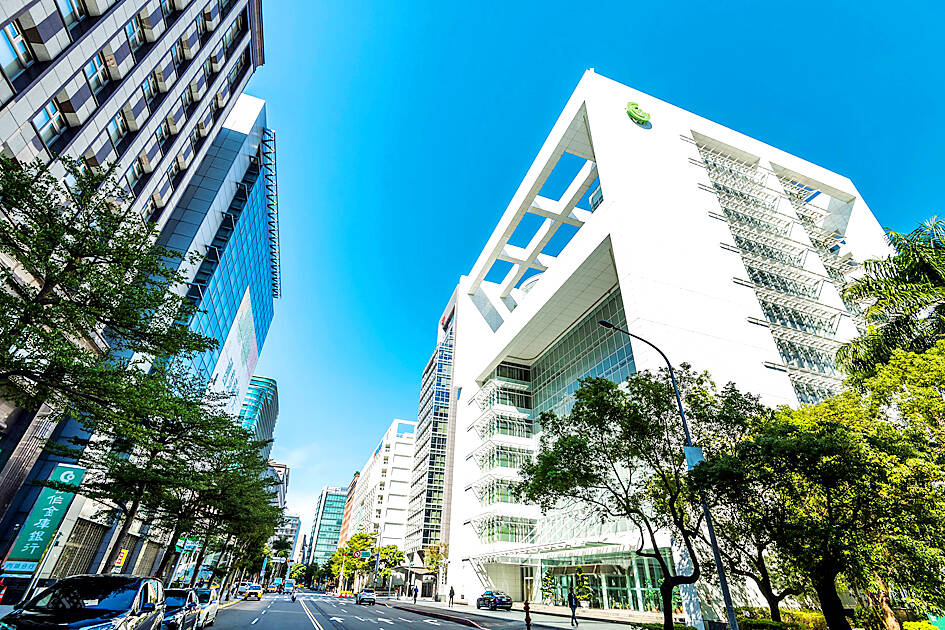Commercial property transactions last quarter more than doubled to NT$56.7 billion (US$1.78 billion) from three months earlier, driven by strong demand from local tech firms to expand their capacity, data released by property consultancy Savills Taiwan (第一太平戴維斯) on Tuesday showed.
Sales surged 176 percent from the same period last year.
Most of the commercial real-estate deals took place in southern Taiwan, with available properties becoming increasingly scarce in the north, Savills Taiwan said.

Photo courtesy of Sinyi Global Management Co
“Technology firms became the largest commercial property buyers by pouring NT$39.9 billion into existing factories, accounting for 70 percent of the deals during the July-to-September period,” Savills research manager Erin Ting (丁玟甄) said.
Taiwan Semiconductor Manufacturing Co (台積電), the world’s largest advanced chipmaker, bought an idle plant in Tainan from flat-panel display maker Innolux Corp (群創) for NT$17.14 billion, as it is increasing its advanced-chip packaging capacity, Ting said.
Micron Technology Taiwan Inc (台灣美光), the local subsidiary of a US producer of computer memory and computer data storage, acquired an industrial property in Tainan from flat-panel supplier AUO Corp (友達) for NT$7.4 billion, she said.
Chip tester and packager ASE Technology Holding Co (日月光投控) bought two industrial complexes in Kaohsiung for NT$5.26 billion to meet expansion needs, she said.
All three firms have benefitted from business improvement linked to an artificial intelligence boom and intend to add capacity by acquiring existing factories, Ting said.
In the first three quarters of the year, commercial property transactions totaled NT$124.9 billion, rising 33 percent from a year earlier, Savills data showed.
Tech firms contributed NT$56.6 billion, or 47 percent, followed by developers and builders at NT$26.3 billion and investment institutions at NT$9.9 billion, it said.
Developers and builders have targeted old hotels, office buildings and factories in major urban areas since urban renewal projects and reconstruction of dilapidated buildings are not subject to the central bank’s loan restrictions, Savills Taiwan said.
By contrast, life insurance companies, traditionally the main players in the commercial property market, stayed low-key in the first nine months of this year.
Ting attributed it to the required minimum investment return of 2.97 percent for life insurers following waves of interest rate hikes.
Soaring property prices in recent years have added to their difficulty, especially in northern Taiwan and special municipalities, Ting said.
Instead, life insurers have sought to use their investment funds for public development projects, Savills Taiwan said.
Taiwan Life Insurance Co (台灣人壽) late last month won a contract to develop a 57,000 ping (188,430m2) plot of land in Taoyuan for NT$13.7 billion, aiming to build hotels, shopping spaces and a mixed-use stadium, it said.

Shares in Taiwan closed at a new high yesterday, the first trading day of the new year, as contract chipmaker Taiwan Semiconductor Manufacturing Co (TSMC, 台積電) continued to break records amid an artificial intelligence (AI) boom, dealers said. The TAIEX closed up 386.21 points, or 1.33 percent, at 29,349.81, with turnover totaling NT$648.844 billion (US$20.65 billion). “Judging from a stronger Taiwan dollar against the US dollar, I think foreign institutional investors returned from the holidays and brought funds into the local market,” Concord Securities Co (康和證券) analyst Kerry Huang (黃志祺) said. “Foreign investors just rebuilt their positions with TSMC as their top target,

REVENUE PERFORMANCE: Cloud and network products, and electronic components saw strong increases, while smart consumer electronics and computing products fell Hon Hai Precision Industry Co (鴻海精密) yesterday posted 26.51 percent quarterly growth in revenue for last quarter to NT$2.6 trillion (US$82.44 billion), the strongest on record for the period and above expectations, but the company forecast a slight revenue dip this quarter due to seasonal factors. On an annual basis, revenue last quarter grew 22.07 percent, the company said. Analysts on average estimated about NT$2.4 trillion increase. Hon Hai, which assembles servers for Nvidia Corp and iPhones for Apple Inc, is expanding its capacity in the US, adding artificial intelligence (AI) server production in Wisconsin and Texas, where it operates established campuses. This

Nvidia Corp chief executive officer Jensen Huang (黃仁勳) on Monday introduced the company’s latest supercomputer platform, featuring six new chips made by Taiwan Semiconductor Manufacturing Co (TSMC, 台積電), saying that it is now “in full production.” “If Vera Rubin is going to be in time for this year, it must be in production by now, and so, today I can tell you that Vera Rubin is in full production,” Huang said during his keynote speech at CES in Las Vegas. The rollout of six concurrent chips for Vera Rubin — the company’s next-generation artificial intelligence (AI) computing platform — marks a strategic

US President Donald Trump on Friday blocked US photonics firm HieFo Corp’s US$3 million acquisition of assets in New Jersey-based aerospace and defense specialist Emcore Corp, citing national security and China-related concerns. In an order released by the White House, Trump said HieFo was “controlled by a citizen of the People’s Republic of China” and that its 2024 acquisition of Emcore’s businesses led the US president to believe that it might “take action that threatens to impair the national security of the United States.” The order did not name the person or detail Trump’s concerns. “The Transaction is hereby prohibited,”